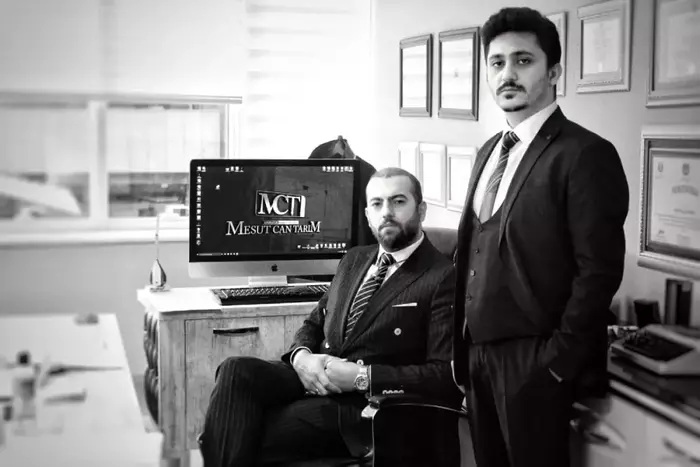MCT
LAW OFFICE & CONSULTANCY
A nation whose judiciary power is not independent cannot be accepted as a state.
M. K. Ataturk
WORKING FIELDS

EUROPEAN COURT OF HUMAN RIGHTS
INDIVIDUAL APPLICATION

CONSTITUTIONAL COURT
INDIVIDUAL APPLICATION

CRIMINAL LAW

ADMINISTRATIVE LAW

COMMERCIAL LAW

LABOUR LAW
OUR TEAM
FAQ

Frequently Asked Questions
What is Legal Assistance?
Legal assistance is a principle that is provided to economically vulnerable members of the society, which aims to remove the barriers to accessing justice. This principle is a necessity of the right to a fair trial.
Legal assistance includes subjects such as exemption from litigation fees and expenses. Legal assistance decisions by bar associations only comprise of appointment of a lawyer. A legal assistance decision must be delivered by a court. A legal assistance request for enforcement-bankruptcy proceedings is made to the enforcement court before which the enforcement proceeding is or will be initiated, whereas there are two options for lawsuits and temporary legal protection measures. The petitioner may request legal assistance together with the case on the merits, or by applying to the court prior to the lawsuit where claims on the merits are to be presented. The court can evaluate the legal assistance request both during the hearing and over the file. However, when requested, a legal assistance request shall be examined at a separate hearing.
Article 339 of the Code of Civil Procedure regulates the collection of litigation expenses postponed due to legal assistance:
(1) All court expenses and advances paid by the State due to the legal assistance decision are collected from the person who is found wrong at the end of the lawsuit or proceedings. In the event that the person benefiting from legal assistance is proved wrong, it may be decided to pay the trial expenses in monthly equal installments within one year at the most, if deemed appropriate.
(2) If it is clear to the court that the collection of the legal assistance expenses paid or exempted by the government due to the legal assistance decision will cause the victimization of the legal assistance beneficiary, the court may decide to exempt it from payment in whole or in part in the judgment.
What is Attorney’s Fee and How Is It Determined?
Attorney’s fee, also known as counsel’s fee, can be freely decided by the parties providing and benefiting from a legal service, within the limits of freedom of contract, and not less than the tariff published by the Union of Turkish Bar Associations (TBB) every year, provided that it is not contrary to the relevant legislation.
Every year, the minimum wage tariffs recommended by the affiliated Bar Association are published in addition to the minimum wage tariff of the TBB Presidency. For example, the second minimum fee for attorneyship recommended by the Ankara Bar Association for 2022 has been published on its official website.
Is Consulting a Lawyer Charged?
Consulting a lawyer is subject to a fee; which means all kinds of legal works, transactions, and consultations are subject to a fee according to the provisions of the relevant legislation[1]. This fee is determined by the minimum wage tariffs for attorneyship as explained above. Lawyers cannot perform any duty without remuneration, including free consultation, because this creates unfair competition, and the lawyer may face a penalty by the relevant bar association for violating the honor of their profession and attorneys’ rights.
[1] Article 136 of Atternoyship Law (Law No: 1136)
Is It Mandatory To Hire A Lawyer?
As in many other legal systems around the world, representation by a lawyer is not obligatory in the Turkish legal system, with exceptions. One may freely pursue litigation processes regarding their own case and represent themself at hearings. As for the exceptions, criminal courts might compulsorily appoint a lawyer in certain situations. Such situations are as follows:
-If the suspect or defendant is minor, mentally ill, deaf and mute, or unable to defend themself,
-If the defendant is on trial for a crime punishable by a prison sentence of more than 5 years,
-If there is an arrest request, in the evaluation of such request,
-If the suspect or defendant is to be taken under observation,
-If the defendant has been removed from the courtroom due to behaviors that endanger the order of the court,
-In case the defendant is a fugitive from justice.
On the other hand, in order not to cause irreparable damages and not to suffer loss of rights before the judiciary, it will be beneficial for the person to get the necessary support from a lawyer in the field of law that requires a certain degree of expertise. Consulting a lawyer not only when faced with a legal problem but also before any legal action will often prevent you from facing major damages.
What is a Power of Attorney and How is it Issued?
In accordance with the relevant article of the Turkish Code of Obligations[1], power of attorney is the undertaking of the agent to fulfil the debt imposed on them pursuant to the contract. According to the relevant article of the Code of Civil Procedure[2], power of attorney for a case “covers the authority of the attorney to carry out all the necessary procedures for the follow up of the case until the judgment becomes final, without prejudice to the matters requiring special authorization in the law.” A power of attorney is a document by which one person authorizes the other to act on their behalf in certain situations, in order to do business and transaction. Power of attorney can be issued in two ways: general or special. A general power of attorney makes representation possible in all cases and proceedings[3], except for cases requiring a special power of attorney.
Those wishing to grant power of attorney to a lawyer to represent themselves can apply to a notary with their identity card or passport, and request from the notary to issue a power of attorney by explaining what the power of attorney is for.
[1] Article 502 of Turkish Code of Obligations (Law No: 6098)
[2]Article 73 of Code of Civil Procedure (Law No: 6100)
[3] Also see for situations that require a special power of attorney: Article 74 of Code of Civil Procedure
What Is A Power Of Attorney And How Is It Issued?
In accordance with Article 502 of the Turkish Code of Obligations, power of attorney is the undertaking of the agent to fulfill the debt imposed on them in accordance with the contract. Pursuant to Article 73 of the Code of Civil Procedure, power of attorney for the case “contains the authority of the attorney to perform all the necessary procedures for the follow-up of the case, until the judgment becomes final, without prejudice to the matters requiring special authorization in the law.” A power of attorney is a document in which one person authorizes the other to act on his behalf in certain situations, and to do business and transaction. Power of attorney can be issued in two ways, general or special. General power of attorney makes representation possible in all lawsuits and proceedings, excluding cases requiring special power of attorney [1].
The person who wants to issue a power of attorney for a lawyer to represent themself can request a power of attorney by applying to the notary with them identity card or passport, explaining what the power of attorney is for.
[1] For situations that require a special power of attorney: See Article 74 of the Code of Civil Procedure
What Is The Right To A Fair Trial?
The Constitution Of The Republic Of Turkey
- Freedom to Claim Rights
ARTICLE 36 – Everyone has the right of litigation either as plaintiff or defendant before the courts through lawful means and procedure. No court may refuse to hear a case within its jurisdiction.
European Convention on Human Right
ARTICLE 6
- In the determination of his civil rights and obligations or of any criminal charge against him, everyone is entitled to a fair and public hearing within a reasonable time by an independent and impartial tribunal established by law. Judgment shall be pronounced publicly but the press and public may be excluded from all or part of the trial in the interests of morals, public order or national security in a democratic society, where the interests of juveniles or the protection of the private life of the parties so require, or to the extent strictly necessary in the opinion of the court in special circumstances where publicity would prejudice the interests of justice.
- Everyone charged with a criminal offence shall be presumed innocent until proved guilty according to law.
- Everyone charged with a criminal offence has the following minimum rights:
(a) to be informed promptly, in a language which he understands and in detail, of the nature and cause of the accusation against him;
(b) to have adequate time and facilities for the preparation of his defence;
(c) to defend himself in person or through legal assistance of his own choosing or, if he has not sufficient means to pay for legal assistance, to be given it free when the interests of justice so require;
(d) to examine or have examined witnesses against him and to obtain the attendance and examination of witnesses on his behalf under the same conditions as witnesses against him;
(e) to have the free assistance of an interpreter if he cannot understand or speak the language used in court.
We can list the basic elements of the fair use of the trial regulated in Article 6 of the European Convention on Human Right as follows:
1- Right to sue in lawful, independent, impartial court
2- Right to a fair trial
3- Right to be tried within a reasonable time
4- Right to be tried in public
The right to be tried before an impartial and independent court established by law; It is one of the most important human rights rights. Due to its importance, it is guaranteed by the constitutions of many countries, national conventions and national laws.
An important element of this right is that the adjudicating authority has the status of a court, is composed of judges, and this court is established by law. In particular, the legal judge guarantee; It refers to the courts that were established by law before the dispute arose and whose powers, duties and judicial procedure to be implemented were determined by law. In this way, the existence of courts that may be affected by the preferences of the leading political power and that may engage in arbitrary practices is prevented. Everyone has the right to be tried before an independent and impartial tribunal with predetermined trial procedure, duty and authority.
At the root of the independence of the courts lies the principle of ‘separation of powers’. The judiciary is independent of the actions of the executive and legislature. One of the basic characteristics of the rule of law is that the judicial authorities can act independently, free from the influence of political and other interventions. Subjective impartiality, on the other hand, is impartiality that is directly dependent on the personal structures of judges. All kinds of situations that may affect whether judges are personally biased or not are examined within the scope of subjective impartiality.
A fair trial is one of the most important principles under which Article 6 of the ECHR is guaranteed. The right to a fair trial; in particular, the right to apply and reach the national courts, to make claims and defenses before these courts, to be aware of the procedural proceedings of the courts and to participate in these proceedings in person or through a representative, the right to defend himself/herself or with the assistance of a lawyer, It includes the right to be investigated on equal basis with their claims and evidence and to be subjected to equal evaluation, the obligation of court decisions to be justified, the public interpretation of the judgment, the right to object to the decision of the first instance court, to a higher court, and to have it reviewed in this court.
The right to a trial within a reasonable time is also one of the important elements of the right to a fair trial. Three basic criteria are used to ensure a trial within a reasonable time. These; the nature of the subject matter, the conduct of the parties during the trial, and whether the conduct of the national trial authorities affected the trial within a reasonable time. One of the important elements in ensuring a fair and equitable trial is the openness of the trial and the public trial. This principle, which is valid for all proceedings, is the external appearance of the judicial proceedings of the court by unrelated persons.
The principle of publicity is important in terms of preventing arbitrary behavior of judges and ensuring impartiality, raising general awareness of law in the public, establishing control in the judicial system, and enabling the public to supervise the case and trial activities.
The openness of the hearings is handled and examined in two contexts. The first of these; direct participation. Means that everyone can enter the courtroom and watch the proceedings.
Another type of publicity, is the announcement of the proceedings to large masses of people through various media such as television, newspaper and radio.
What is an Attorney Contract?
The legal relationship between a lawyer and their client is subject to substantive law; It is a contractual relationship in the field of private law.
The attorney-client relationship emerges as a contract that sets forth the services that attorneys wish to fulfil and in which attorneys undertake to operate within the framework of their client’s will in return for a fee. This contract is called an attorneyship contract and it is one of the contracts that impose debts on both parties and is valid according to the Turkish Code of Obligations. However, according to the type of contract that arises from the content of a certain element of the work, requires employment contracts and is close to the legally hosted service, work, power of attorney, broadcasting contracts, evacuation of the provisions to which it is subject should be sought.
Employment contracts, whose characteristic features can be determined as working for the benefit of another person completely or substantially, have types such as factoring, franchising, banking transactions, travel contracts, architectural contracts, as well as legally regulated ones. While this contract was amended by Law No. 4667 on Attorneyship Law No. 1136, it was brought into legal regulation under Article 163 under the name of attorney contract. The content of the legal assistance expected from the lawyer and the attorney that was concluded between the attorney and the client and the power of attorney assumed by the attorney have been placed on a legal basis. The fact that the concept and institution of “attorneyship contract” is first specified in the law is a necessity. When it comes to qualified services such as attorneyship and architecture that require a special academic education and formation, creating sui generis contract types for these services is a requirement arising from the structures of mutual acts. This is how they were created and accepted. Professional services of advocacy and defence have been regulated in the Attorneyship Law and the Legal Code of Conduct, which form a field of law that is completely service-specific. It is possible to call this as “Lawyer Profession Law”. These rules also include provisions regarding the relationship of a lawyer with the various persons and organizations that he or she is in contact with due to their profession, especially the relationship with the employer.
The relationship of the lawyer with their client cannot be fit into the service and mandate contract patterns of the Code of Obligations. Advocacy, which is one of the “public services”, is one of the services where “high due diligence obligation” is sought. In terms of lawyers, pursuant to Article 506/III of the Turkish Code of Obligations, “the behavior required by a prudent attorney who undertakes work and services in a similar field shall be taken as basis in determining the responsibility of the duty of care of an attorney”. Although the attorneyship contract is defined in the Attorneyship Law, if there is no applicable provision in the attorneyship law, it can be defined as a contract in which the provisions of the attorney agreement of the Code of Obligations can be applied.
The subject of working specific to the legal profession may be the representation of the client before the court and other official authorities. There may also be activities such as being present during the conclusion of contracts, written and verbal consultations, in order to assist in the regulation of legal relations or to draft a contract and prepare a company statute or will, to examine the land registry and trade registry records, to protect the client’s interests.